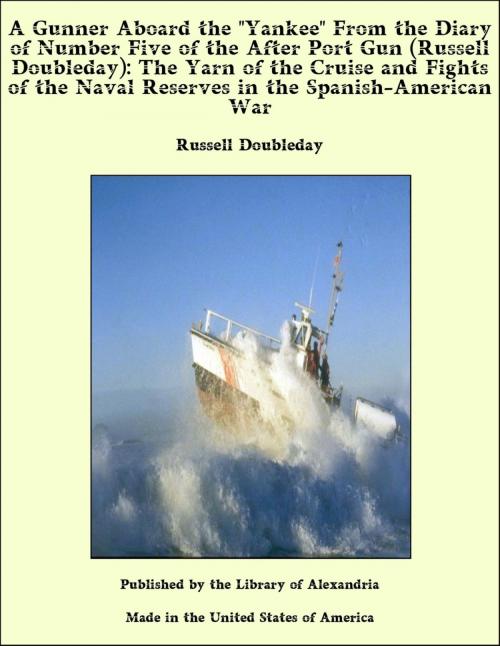A Gunner Aboard the "Yankee" From the Diary of Number Five of the After Port Gun (Russell Doubleday): The Yarn of the Cruise and Fights of the Naval Reserves in the Spanish-American War
Nonfiction, Religion & Spirituality, New Age, History, Fiction & Literature| Author: | Russell Doubleday | ISBN: | 9781465624383 |
| Publisher: | Library of Alexandria | Publication: | March 8, 2015 |
| Imprint: | Language: | English |
| Author: | Russell Doubleday |
| ISBN: | 9781465624383 |
| Publisher: | Library of Alexandria |
| Publication: | March 8, 2015 |
| Imprint: | |
| Language: | English |
As the Commander-in-Chief of the American Naval Squadron blockading Santiago and the Cuban coast, the auxiliary cruiser "Yankee," manned by the New York Naval Reserves, came immediately under my observation, and it is a pleasure for me to speak of the spirit and efficiency shown by the officers and crew during their stay under my command. The young men forming the ship's company of the "Yankee" were called into service several weeks prior to any other Naval Reserve battalion; they came from all walks of civil life, and their minds, devoted to peaceful pursuits, were suddenly diverted to the needs and requirements and the usages of naval routine. Notwithstanding this radical change, they have made the name of their ship a household word throughout the country, and have proved that the average American, whether he be clerk or physician, broker, lawyer, or merchant, can, on the spur of the moment, prove a capable fighter for his country even amid such strange and novel surroundings as obtain in the naval service. These young men have especially upheld the American supremacy in the art of gunnery, and have, on all occasions, proved brave and efficient. The conclusion of the Spanish-American War released them from their voluntarily assumed positions in the regular navy, but when they returned to civil life they carried with them the consciousness of duty well done at Santiago and Cienfuegos and whenever their guns were used in hostile action. In a word, the Naval Reserves manning the "Yankee," in common with those on board other vessels in the service, have proved their aptitude for sea duty, and made apparent the wisdom of the Government in calling them into active service.
As the Commander-in-Chief of the American Naval Squadron blockading Santiago and the Cuban coast, the auxiliary cruiser "Yankee," manned by the New York Naval Reserves, came immediately under my observation, and it is a pleasure for me to speak of the spirit and efficiency shown by the officers and crew during their stay under my command. The young men forming the ship's company of the "Yankee" were called into service several weeks prior to any other Naval Reserve battalion; they came from all walks of civil life, and their minds, devoted to peaceful pursuits, were suddenly diverted to the needs and requirements and the usages of naval routine. Notwithstanding this radical change, they have made the name of their ship a household word throughout the country, and have proved that the average American, whether he be clerk or physician, broker, lawyer, or merchant, can, on the spur of the moment, prove a capable fighter for his country even amid such strange and novel surroundings as obtain in the naval service. These young men have especially upheld the American supremacy in the art of gunnery, and have, on all occasions, proved brave and efficient. The conclusion of the Spanish-American War released them from their voluntarily assumed positions in the regular navy, but when they returned to civil life they carried with them the consciousness of duty well done at Santiago and Cienfuegos and whenever their guns were used in hostile action. In a word, the Naval Reserves manning the "Yankee," in common with those on board other vessels in the service, have proved their aptitude for sea duty, and made apparent the wisdom of the Government in calling them into active service.















